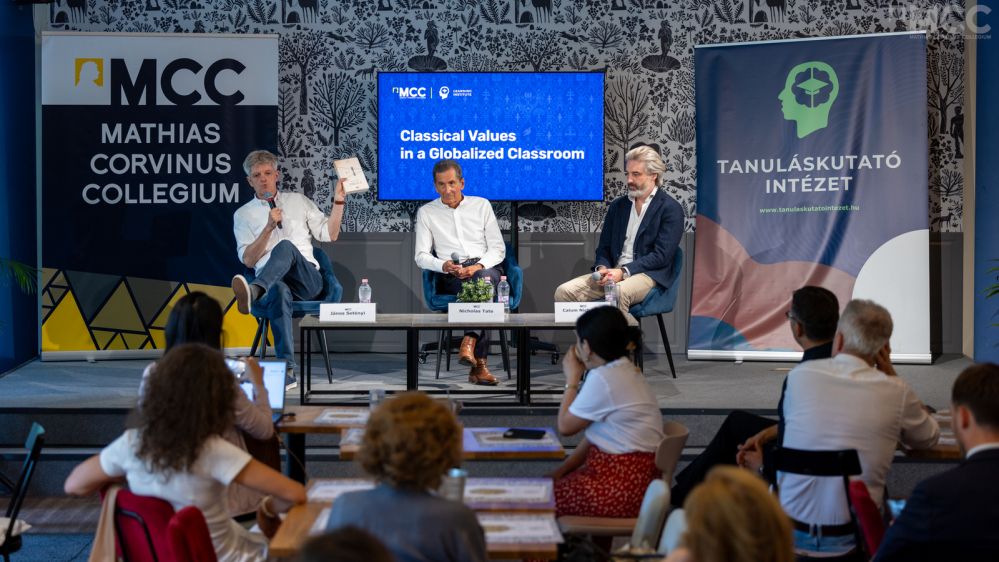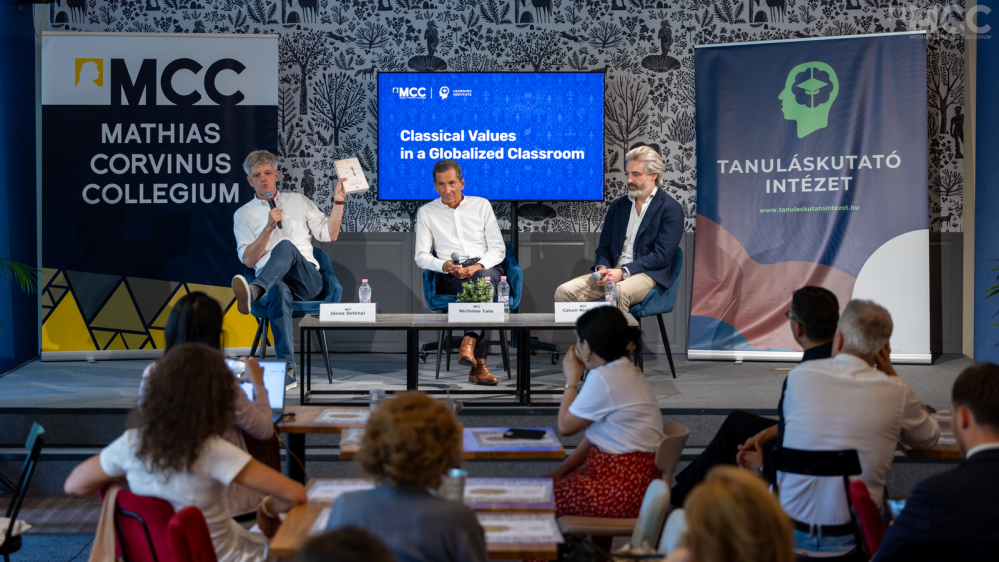According to Nicholas Tate, a former advisor to the British Minister of Education, schools are under immense pressure to adopt progressive ideology, so battles must be fought.
The debate about the principles of conservative education has been ongoing in Hungarian public life for half a year now. Regarding this issue, Balázs Orbán, the Prime Minister's political director, published a study in the journal Kommentár. János Setényi, the director of the Institute for Learning Research, gave a lecture on the Prussian educational method in March. This time, they talked with renowned Hungarian and international experts about classical values in today's globalized world.
Nicholas Tate, historian and former educational advisor, was a guest of the Mathias Corvinus Collegium (MCC) Institute for Learning Research. As the CEO of England's national body, Tate oversaw the introduction of the new national curriculum between 1994 and 2000. Tate became known for emphasizing the role of the curriculum in shaping national identity, which sparked debates in the education world. During the event, János Setényi and Calum T.M. Nicholson, the director of the Institute for Climate Policy, jointly sought answers with Tate to the challenges of progressivism in Western education.
In his introductory question, Setényi raised the issue of tension between global expectations and local realities in education. Tate highlighted that schools and nation-states are under enormous pressure from the EU, which can only be countered by adhering to the classical form of education that focuses on the transmission of knowledge.
According to the former ministerial advisor, it is essential not to break under pressure; the goal should be to impart knowledge of national history. He recently read a 2021 UNESCO document, which had just come to his attention, titled "Reimagining Our Futures Together!" The document proposed a new global social contract in the field of education.
As Tate explained, the document was "shameful" because it encouraged schools to "fight against nationalism and populism." The text supported multiculturalism and was "very authoritarian." Tate argued that the problem is not with focusing on European history, but it is essential to chronologically know the fundamental history of the nation.
Nicholson drew attention to two types of pressure that are not necessarily global: political and managerial or technical pressure. The former is wokeism, which he did not want to discuss in detail as it is widely talked about. The lesser-known is the managerial elite's expectation to "decolonize our curriculum."
This narrative is conveyed by the human resources (HR) departments in workplaces. They represent the neoliberal impulse that "the customer is always right" and transfer this into the education world. However, according to Nicholson, at the university, the "customer," or the student, is not always right; in fact, they are there to learn from the professors, not to intimidate them. "If you are always right, why are you even learning?" he questioned.
Nicholson stated that universities have become business-oriented and evaluate in a quantitative manner, following the "publish or perish" principle. However, some great scientists in history wrote only one or two books or articles. The quantitative approach does not allow for consideration of quality. Unfortunately, this leads to a situation where many only take natural science degrees seriously, and humanities have discredited themselves. We should find the golden mean, knowing both mathematics and Shakespeare.
Setényi pointed out that Scotland had a tradition of Enlightenment preceding the French, sparked the Industrial Revolution, and had an excellent education system. However, nowadays, the quality of education is declining, their national curriculum is not mandatory, and political indoctrination has reached classrooms. Austria and Finland show the same picture.
According to Tate, a radical progressive elite has taken over the Anglo-Saxon world, including England, Scotland, Ireland, Canada, America, Australia, and New Zealand. The source of all this is America, whose changes are adopted without criticism. The process goes like this: progressive ideology is cemented into the school system, thus creating a progressive elite. They now control universities, schools, museums, and galleries. They are joined by the market sector, where HR departments advocate the principles of diversity, equality, and inclusion.
In British schools, instead of transmitting knowledge, they focus on daily political issues. They propagate the idea that the whole world is enmeshed in a power network that we do not understand and unintentionally serve, and we must fight against it. They promote divisive politics that are disadvantageous for everyone, including minorities. In America, this ideology is already widespread; in England, they are still fighting against it. This is a major battle that has been won in some places but lost in many others.
Nicholson emphasized that in the Anglo-Saxon world, there was previously a "big brother and little brother" relationship, such as America and Canada or Australia and New Zealand. Nicholson attended Scottish schools where children were more homophobic than in England. But nowadays, this has reversed; due to the internet, even formerly "provincial" places want to follow the "latest ideas." They are like nouveaux riches with no taste: they want the newest and unthinkingly adopt the dominant ideologies seen in America. Therefore, places like Scotland, Wales, or Ireland can sometimes be more radical than America. It turned out that both Tate and Nicholson are working on exciting new books related to the topic, both to be published by MCC Press.
Setényi highlighted that in certain societies, students still work hard, such as the Chinese and the Hungarians. This is related to culture and family. Tate added that clear and high expectations must be set. He visited English and Swiss schools where philosophy was taught at the elementary level. The students' thinking was impressive, reinforcing his view that students should not be underestimated. Nicholson emphasized that it matters a lot if teachers speak passionately about their subjects. Tate noted that teachers are taught a lot about methodology and little about their subjects, and their knowledge in their fields should be updated.












